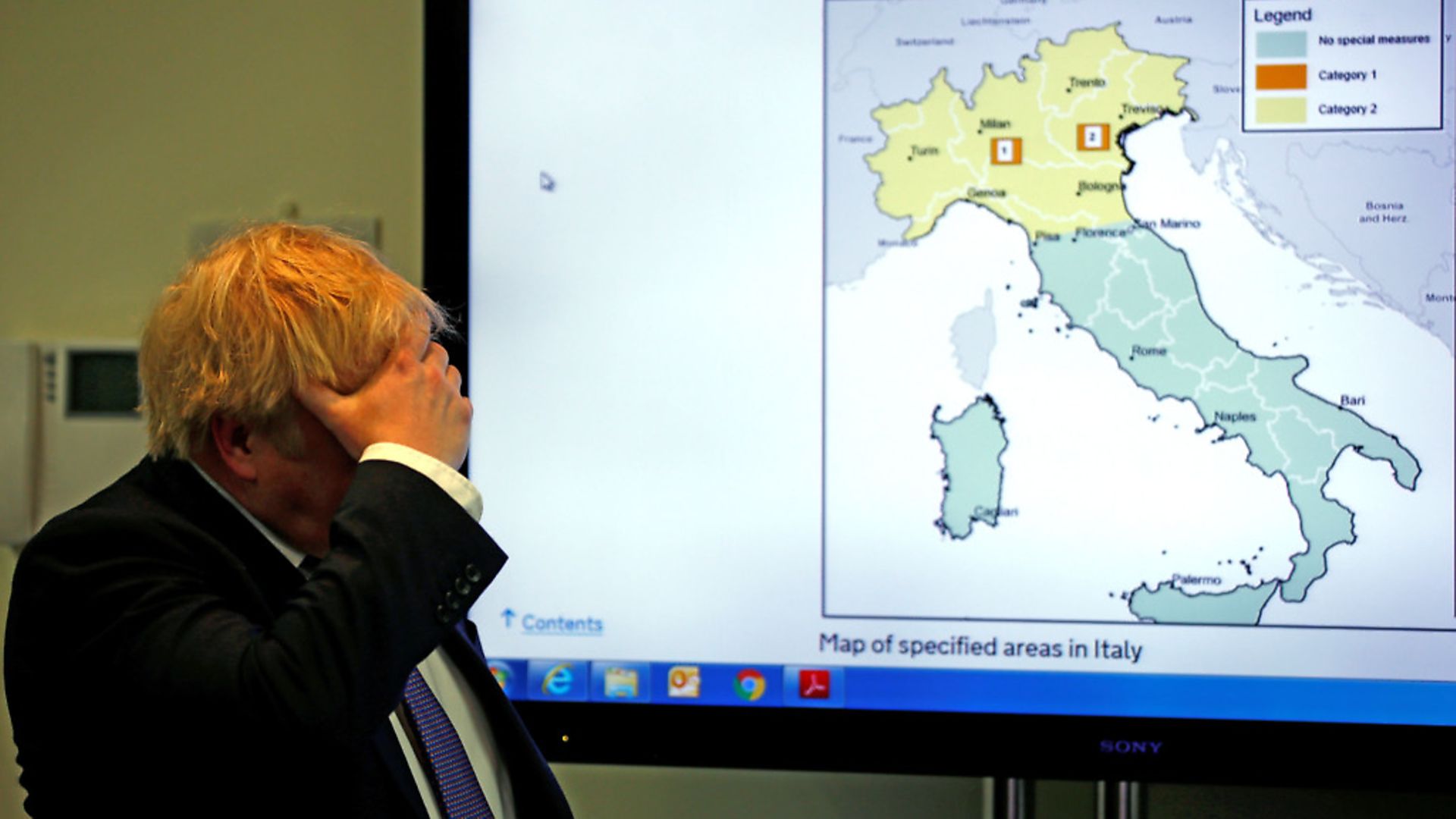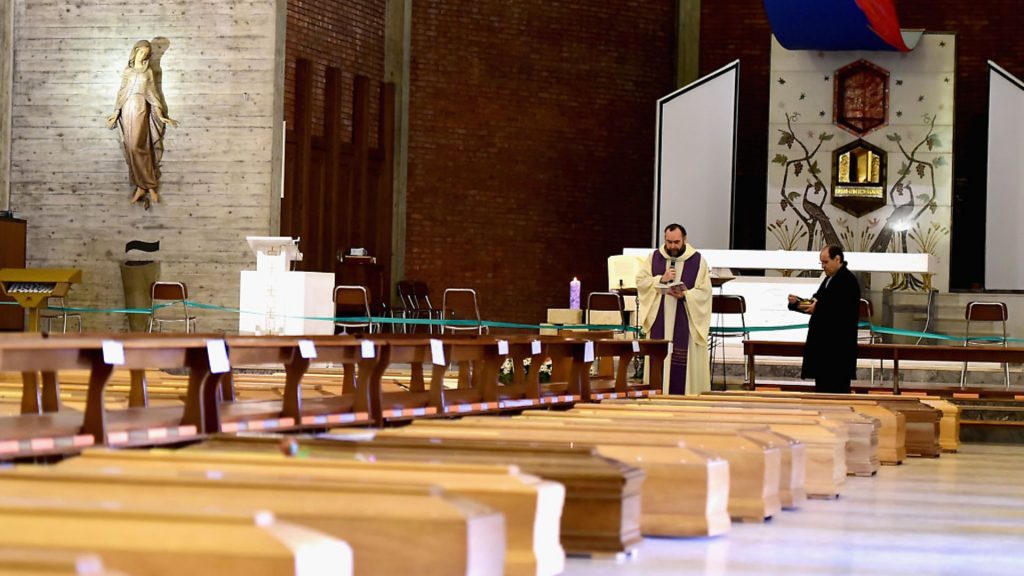
PATRICK SAWER explores the enduring trope of the cowardly Italian and finds far more fitting illustrations of the country’s national character.
Heard the one about the number of gears on an Italian tank? ‘Six. One forward, five reverse’.
Or the one about the smallest book in the world? ‘The Italian Book of War Heroes’.
Funny, eh? It may be hard to credit – having witnessed the calm and stoicism, not qualities normally associated with Italy, with which the bulk of its citizens responded to the national agony wrought by coronavirus – but these gags were once common currency in the UK.
And while they might have been the stuff of harmless playground jibes, as a recent arrival it took me a while before I stopped taking this particularly British brand of humour personally.
Have your say
Send your letters for publication to The New European by emailing letters@theneweuropean.co.uk and pick up an edition each Thursday for more comment and analysis. Find your nearest stockist here or subscribe to a print or digital edition for just £13. You can also join our readers' Facebook group to keep the discussion and debate going with thousands of fellow pro-Europeans.
As children do, I quickly suppressed my own comedy Italian accent in favour of a neutral Essex and grimaced along. But it took longer for me to understand quite where this association of Italians with cowardice came from.
We were barely 30 years from the end of the Second World War when, fresh from Rome and full of excitement and trepidation, I arrived at my new school in Chelmsford. The comics passed around between my new friends – Victor, Battle, Commando, Warlord – were still full of war stories featuring plucky Tommies battling the Axis powers.
These were overwhelmingly represented in cartoon form by the fiendishly efficient and fanatical Germans. When Italian soldiers, the Nazi’s allies, made an appearance they were invariable derided as comic and cowardly buffoons, knock-kneed and quaking, gesticulating wildly or munching platefuls of pasta.
A decade on, these stereotypes were made flesh in ‘Allo, ‘Allo!, the 1980s sitcom set in occupied France.

This featured Captain Alberto Bertorelli, a clownish tin-pot proxy for Benito Mussolini, and who, like the fascist dictator, was prone to vain and self-aggrandising declarations, along with the catchphrase: ‘What a mistake-a to make-a!’
Still, there was something preferable about the figure of the comedy Italian, who was at least recognised for his love of life, than that of Herr Flick, the clinical, heartless Nazi – unless of course you happened to be the only German kid in the playground.
The popularity of ‘Allo, ‘Allo! and those comics among some of my friends didn’t help explain to me how Italians, people like my uncles, cousins and late grandfather back in Rome, had acquired a reputation for cowardice, particularly on the field of battle.
It was only later that I came to realise that the roots of this trope lay in British wartime propaganda.

The notion that cowardice is a national trait south of the Alps was the creation of the Allied media between September 1940 and February 1941, in their reporting of the way just 36,000 British troops managed to put more than 230,000 Italians to flight in the North African campaign.
The pitiful sight, captured on Pathé newsreels and relayed in cinemas across wartime Britain, of badly equipped and shoddily uniformed Italian soldiers laying down their weapons in their thousands across the deserts of North Africa, left an indelible impression on audiences. It was one that would be transmitted down the years, in jokes, cartoons and comic sketches.
During the war the British public’s attitude to Italy’s apparent lack of military virtues – a disdain that would filter down to my playground three decades later – found a more vicious echo in the behaviour of the peninsula’s erstwhile allies, the Germans.
Following the fall of Mussolini and Italy’s eventual surrender to the Allies in September 1943, the Nazis came to regard their former comrades in arms with utter disdain and contempt.
To the German army, which poured south into Italy to occupy the country, the Italians were subhuman, dishonourable cowards who had betrayed the Fuhrer and the fascist cause.
The revenge they meted out was terrifying, especially when the vanquished Latins dared to offer any form of organised armed resistance to the Nazis and the remnants of Mussolini’s fascist regime.
The German attitude towards a supposedly inferior people played itself out in hundreds of acts of repression and reprisal, culminating in a string of massacres, such as that of 335 mostly civilian men and teenagers at the Ardeatine caves outside Rome, on March 14, 1944.
But terror didn’t defeat the resistance movement.
Over the 18 months that followed the Nazi invasion of Italy there were countless examples of quiet courage and dignity, as well as acts of astonishing bravery, as teachers, factory workers, farmers, shopkeepers, former soldiers, lawyers, housewives and every type of Italian, first took to the mountains in small partisan bands, before eventually reaching the level of military and political strength and sophistication which enabled the resistance to stage successful insurrections across the centre and north of Italy.
Paradoxically it was learning about the Italian surrender to the Allies, and the resistance to the Nazis that followed – a battle of truly David and Goliath proportions – that reconciled me to all those jokes about the yellow-bellied ‘Eyeties’.
As the military historian Walter S. Zapotoczny writes: ‘The fact that the average Italian soldier chose not to lay down his life in pursuit of Mussolini’s dream of conquest is cause for reexamination of the question as to whether the Italian Army in North Africa was a cowardly lot or a victim of circumstance.’
Was it really a badge of dishonour that the Italians had eventually decided not to sacrifice themselves for the vainglorious martial fantasy of Mussolini, a fantasy that had brutalised Italy since his fascists had taken power in 1922 and left much of the country in ruins?
The legacy of its own shameful imperial adventures in North Africa, during which the nascent Italian Air Force dropped mustard gas on the Abyssinians, and its disastrous participation in the 1939-45 war, had a lasting effect on the Italian public, inhibiting any future militaristic impulses, even if the country’s democratic post-war governments had wanted to indulge in them.
Indeed over the past 70 years it’s armed forces, part of Nato since the alliance was founded in 1949, have preferred to take part in peacekeeping operations rather than lending military support to US-led conflicts, such as the invasion of Iraq.
In Lebanon, between 1982 and 1984, the Italian contingent of the peacekeeping Multinational Force (MNF) appeared at first to reinforce the stereotype of the good-natured comic buffoon.
Foreign correspondents were amused by the sight of the elite Bersaglieri divisions landing on beaches in armoured vehicles painted vivid white to denote their peacekeeping duties, their ostrich-feathered caps bobbing up and down as they trotted ashore in their characteristic high-stepping style. The Italians became known for handing out pasta to destitute Palestinians in Lebanon’s refugee camps – fulfilling yet another stereotype of the national character.
But as Robert Fisk observed in his book Pity The Nation, an apparent lack of military prowess wasn’t such a drawback. Some Italian officers learnt rudimentary Arabic to aid their communication, while their troops – many from the impoverished Italian south – appeared to display a certain empathy for Lebanon’s refugees, which eased relations in the camps they were tasked with protecting.
The character of the comedy Italian who flees in the face of danger resurfaced in a farcical way when the cruise liner the Costa Concordia ran aground off the Tuscan island of Giglio, in January 2012.
Rather than staying with his ship until the last of his crew and passengers were evacuated, Captain Francesco Schettino made a dash for it – climbing onto the first available lifeboat to safety.
This despite the fact it was he who had brought the ship close to shore in nautical ‘wave’ to a retired colleague.
In the chaos that followed the impact Schettino phoned his mother, telling her, before jumping ship: ‘Mum, there’s been a tragedy… but don’t worry, I tried to save the passengers.’
Here were two cliches for the price of one: the cowardly mother’s boy. To add a third Captain Calamity – as he was dubbed by the British press contingent (myself included) covering his escapades – was accused of having brought his girlfriend, a Moldovan called Domnica Cemortan, onto the bridge, apparently distracting him at the crucial moment.
Thirty two people were killed when the Costa Concordia ran aground and Schettino was deemed to have shamed his country.
The fury of those Italians embarrassed by his lack of professionalism was encapsulated by Gregorio de Falco, a coastguard official who, at the height of the drama, as the Costa Concordia listed helplessly and Captain Calamity made for safety, screamed at him on ship to shore radio to return to his post and do his duty.
‘Look Schettino, you may have saved yourself from the sea, but I’m going to see you get it… I’m going to make sure you’re in real trouble,’ he shouted at Schettino, before adding the phrase that would later be printed on T-shirts in Italy. ‘Get the f**k back on board!’
With that epithet it was as if de Falco had intervened on behalf of all of us fed up with those playground jokes and embarrassed that once again a cowardly Italian had become the punchline to another gag.
Perhaps the country’s response to coronavirus – glaring early mistakes notwithstanding – has put the myth of the cowardly Italian to rest. It ought to.
Here’s one more folks. Heard the one about the Italian doctors, nurses and health workers who put their lives on the line to fight Covid-19? More than 200 of them died
Patrick Sawer is a senior reporter on the Daily and Sunday Telegraph
Warning: Illegal string offset 'link_id' in /mnt/storage/stage/www/wp-includes/bookmark.php on line 357
Notice: Trying to get property 'link_id' of non-object in /mnt/storage/stage/www/wp-includes/bookmark.php on line 37






